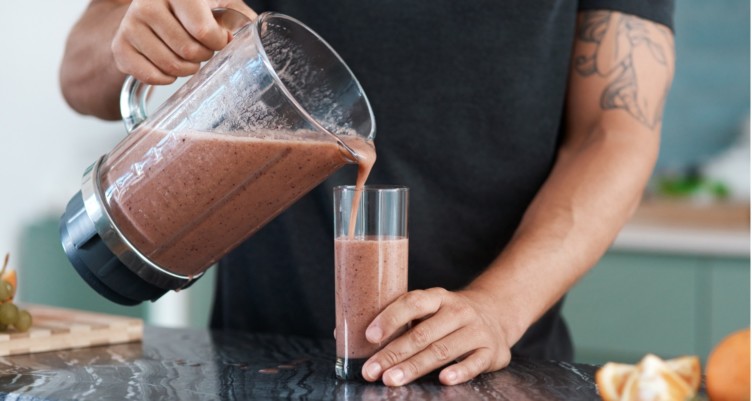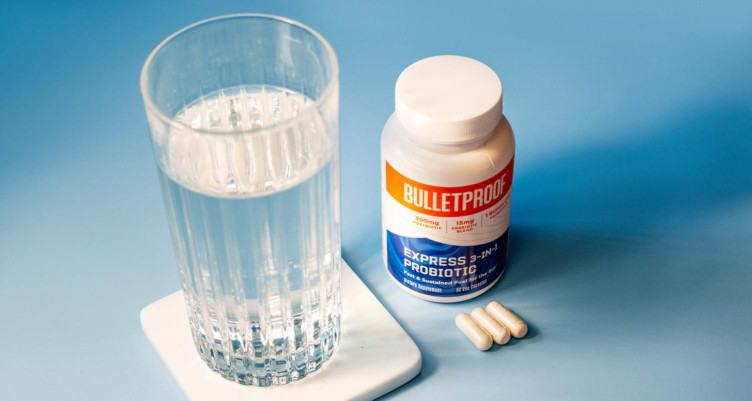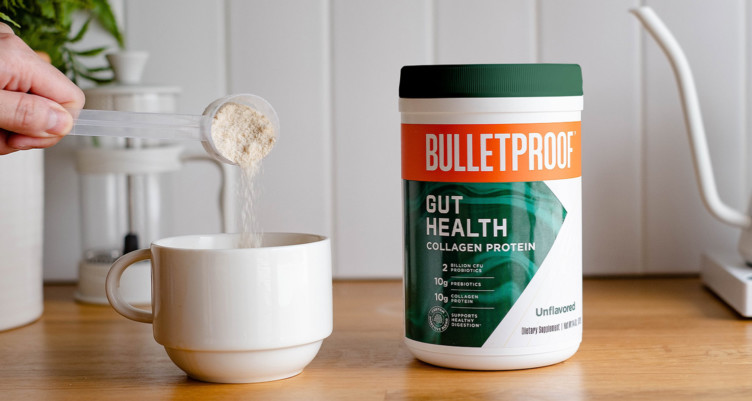Inside Bulletproof: You Already Know About Prebiotics and Probiotics—Time to Meet Postbiotics

- Probiotics are the good bacteria that live in your gut. Prebiotics feed your good bacteria. You need both to maintain a healthy gut. But what about postbiotics?
- If you want to hop on the fast lane to better gut health, you should care about postbiotics. These are the products of healthy gut bacteria, and they’re kind of a big deal.
- Find out what postbiotics are, how to support postbiotic production and ways to boost your overall gut health.
You have likely heard of prebiotics and probiotics, but have you heard of postbiotics? While the term may be new, the principles and properties date back to antiquity and serve to complete the comprehensive collection that is the microbiome.
Gut health starts with your gut bacteria…

To put postbiotics into perspective, we will start at the beginning.
Like us, bacteria have their own unique nutritional requirements. When we eat, the bacteria that inhabit our small intestine get first choice. They eat a good portion of the nutrients upfront. That means most nutrients won’t reach the large intestine intact, and the bacteria inhabiting this region will begin to starve. It’s important to ensure that nutrients reach your large intestine intact because the vast majority of gut bacteria reside in the large intestine.
Desperate times call for desperate measures. When bacteria get desperate, they will harvest any nutrients that are available. While gut bacteria prefer carbon as their primary energy source, they will make an exception and begin to metabolize nitrogen from amino acids.
Here’s what that means for you: Hungry bacteria aren’t happy bacteria. If the bacteria in your large intestine aren’t getting any food, they’ll take matters into their own hands, which may result in the production of toxic metabolites, including ammonia and p-cresole.[1]
Toxins? No thanks.
Related: Gut Bacteria and Weight Management: What You Need to Know
Enter prebiotics

Prebiotics are fermentable fibers that are capable of reaching the large intestine intact. By doing so, they serve as a nutrient source to increase the number of the beneficial bacteria residing in your gut.
Think of prebiotics as fuel for the factories. They are composed of carbon chains (i.e., the preferred energy source for bacteria) that are resistant to digestion in the small intestines. If you don’t eat enough prebiotics, you aren’t feeding your good gut bacteria, which shifts the microbial diversity of your gut.
A normal, healthy state is referred to as “eubiosis.” When the microbial diversity begins to shift to that of an unhealthy state, it is referred to as “dysbiosis.”[2] To promote a healthy gut and maintain eubiosis, it is imperative to feed your bacteria a diet that consists of adequate prebiotics.
Related: Why Prebiotics Are More Important Than Probiotics for Your Gut
…And then, probiotics

When adequate amounts of prebiotics are consumed, they feed the beneficial bacteria. You know them as “probiotics” or “live microbials.” In a favorable environment, these beneficial bacteria multiply so you get more of the good guys in your gut.
In this sense, probiotics can be thought of as the factories themselves. Probiotics carry out a myriad of functions, such as creating neurotransmitters and other metabolites that deliver health-promoting properties.
Ultimately, the benefits of probiotics come from the products they produce.
Presenting: postbiotics

You might be less familiar with this “biotic” term, but if better gut health is what you’re after, you should know about postbiotics. Over time, probiotic bacteria create postbiotics. They’re the health-promoting products of healthy gut bacteria. They’re called “postbiotics” because they’re formed after (or “post”) probiotic metabolism. Think of it this way: Prebiotics are fuel for the factories. Probiotics are the factories themselves. Postbiotics are the products that the factories produce.
These products include a class of compounds referred to as short-chain fatty acids (SCFAs). While all SCFAs play an integral role in maintaining intestinal homeostasis, we’re talking about one SCFA in particular: butyrate. When it comes to gut health, butyrate is considered the all-star.
Here are a few benefits of butyrate for the gut:[3]
- Serves as the primary fuel source for colon cells.
- Facilitates normal cell differentiation and proliferation.
- Stimulates intestinal mucosal production, strengthening intestinal barrier function
- Controls which molecules cross the intestinal barrier by regulating the expression of tight junction zones
While this may seem like a lot, this is only the tip of the iceberg when it comes to butyrate’s benefits. Supplementing with Bulletproof Express 3-in-1 Probiotic is a convenient, efficient and gentle way to add postbiotics directly to your diet. It contains tributyrin, a form of butyrate that reaches the large intestine intact and remains bioavailable.†
So, why do we need postbiotics?

It is estimated that 95% of American adults and children consume under the recommended amount of dietary fiber.[4] Without enough fuel for the factories to produce the products, the products themselves become compromised.
While nothing can replace adequate prebiotic intake, supplementing with butyrate can help to provide more of the products that are necessary to support optimal gut health. Normally, you consume prebiotics to feed probiotics, and then you have to wait for those probiotics to produce the postbiotics. That takes time. When you take butyrate as a supplement, it bypasses normal metabolic processes. So, butyrate skips the line.
By taking this shortcut, you speed up the benefits of butyrate (score!). It serves as a direct energy source to fuel the gut, support regularity, soothe the GI tract and help support a healthy gut lining. The result? A well-nourished gut that is backed by science.
Related: How to Improve Gut Health and Support Your Microbiome
How to add postbiotics to your daily diet

There are many ways to add postbiotics to your daily diet. The first is to produce them internally by eating enough prebiotics. Resistant starch is highly fermentable and is a great way to increase your consumption of prebiotics.
Currently, there is no maximum limit for dietary fiber. Pro tip: The FDA has established a Daily Value of 28g per day for dietary fiber, so be sure to consume at least this amount on a daily basis.
Fermented foods, such as amasai (a fermented milk beverage), sauerkraut, kombucha and pickles are another way to add postbiotics to your daily diet. However, if you are sensitive to histamine, it may be best to avoid fermented foods and focus on fiber from non-fermented food sources and supplements.
Express 3-in-1 Probiotic provides a science-backed postbiotic, probiotics and prebiotics to give you the building blocks for healthy digestion.† Including this supplement in your stack is a sound strategy to show your gut microbiome some love. To complement this practice, Bulletproof InnerFuel Prebiotic and Bulletproof Gut Health Collagen Protein both go the extra mile and contain prebiotics that have been shown to support a healthy gut by increasing the number of beneficial bacteria.†
Heads up: When the population of beneficial bacteria increases, so does the production of postbiotics. When short-chain fibers, like fructooligosaccharide (FOS), are fermented quickly, it may lead to excessive gas and bloating. We don’t use short-chain fibers in our prebiotics. InnerFuel Prebiotic and Gut Health Collagen Protein were formulated for gentle gut support. The prebiotics in these formulas are long-chain fibers that are fermented slowly, just the way we like it. Take these with peace of mind knowing your gut won’t retaliate.†
Related: Why Fermented Foods Don’t Work for Everyone
Is overconsumption of postbiotics a thing?

Butyrate, in particular, is well-tolerated at very high doses that far exceed those found in Express 3-in-1 Probiotic. It has been reported that under clinical conditions, it is nearly impossible to overdose on butyrate. Moreover, tributyrin, the form of butyrate found in Express 3-in-1 Probiotic, is considered Generally Recognized as Safe (GRAS) by the FDA.
Butyrate is naturally produced and has been used in trials on sensitive populations with successful outcomes. With this, trials administering oral doses significantly higher than those found in Express 3-in-1 Probiotic did not report adverse reactions or side effects.
While we are not aware of any contraindications with butyrate supplementation, we advise you to consult your healthcare practitioner before use, particularly if you are pregnant, nursing, taking medication or have a medical condition. If you are increasing postbiotic production by consuming more prebiotics, you may experience gastrointestinal distress if you consume too high of doses and/or certain forms. To mitigate this, start slow, determine which forms are right for you and gradually increase your intake over time.
Remember: Rome wasn’t built in a day!
The bottom line: Health includes your gut. When your gut bacteria are in tip-top shape, you can get more nutrients out of your food, maintain regular digestion and support everything from your immune system to your mood. Prebiotics and probiotics are the building blocks for a healthy gut—but the benefits of probiotics come from the compounds they produce, aka postbiotics.
Take the fast-track to gut health by increasing the production of postbiotics. To make that happen, consume more prebiotics, up your intake of probiotic foods and experiment with a postbiotic supplement. Take care of your gut bacteria, and they’ll take care of you.
Did you know stress can also impact your microbiome? Learn how stress and the gut are interconnected.
Sign up for early access to sales, product launches, the latest Bulletproof news and more!



